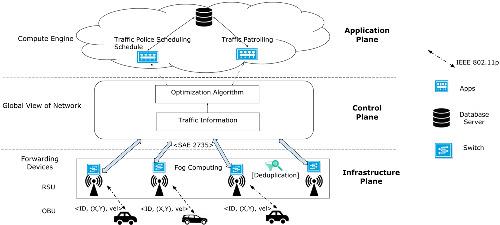当前位置:
X-MOL 学术
›
Int. J. Commun. Syst.
›
论文详情
Our official English website, www.x-mol.net, welcomes your feedback! (Note: you will need to create a separate account there.)
Machine learning‐based traffic scheduling techniques for intelligent transportation system: Opportunities and challenges
International Journal of Communication Systems ( IF 2.1 ) Pub Date : 2021-04-01 , DOI: 10.1002/dac.4814 Mahima Nama 1 , Ankita Nath 1 , Nancy Bechra 1 , Jitendra Bhatia 1 , Sudeep Tanwar 2 , Manish Chaturvedi 3 , Balqies Sadoun 4
International Journal of Communication Systems ( IF 2.1 ) Pub Date : 2021-04-01 , DOI: 10.1002/dac.4814 Mahima Nama 1 , Ankita Nath 1 , Nancy Bechra 1 , Jitendra Bhatia 1 , Sudeep Tanwar 2 , Manish Chaturvedi 3 , Balqies Sadoun 4
Affiliation

|
The rise in traffic congestion has become a significant concern in the urban city environment. The conventional traffic control systems with inefficient human resources management fail to control the traffic discipline, leading to increased traffic density and road offenses. However, the intelligent transportation system (ITS) can provide safety, efficiency, and sustainability for large‐scale vehicular traffic dilemmas. ITS unites machine learning with the available traffic control force and performs real‐time police scheduling to ensure the smooth flow of traffic. Many researchers have demonstrated notable work in intelligent traffic police scheduling and deployment using various optimization algorithms. However, the compilation of such praiseworthy work as a whole is still missing. Motivated by these facts, we provide a comprehensive review of the machine learning‐based state‐of‐the‐art technologies that can be used to form a three‐tier solution taxonomy. The first tier describes various tools and technologies that can be utilized to collect traffic data. The second tier highlights the machine learning algorithms and their accuracy, which forms a pattern in the collected data and then yields some crucial information about traffic flow, congestion levels, and so forth. In the third tier, the most vital taxonomy layer, various traffic police scheduling strategies are discussed. The proposed survey also presents the use of cases of traffic police scheduling that elaborates this review's applicability in various domains. Finally, some of the key challenges in the subject being reviewed are discussed, which initiates a further scope of improvement.
中文翻译:

基于机器学习的智能交通系统交通调度技术:机遇与挑战
交通拥堵的上升已经成为城市环境中的重要问题。具有人力资源管理效率低下的传统交通控制系统无法控制交通纪律,从而导致交通密度和道路违法行为增加。但是,智能交通系统(ITS)可以为大规模的车辆交通难题提供安全性,效率和可持续性。ITS将机器学习与可用的交通控制力量结合在一起,并执行实时警务调度,以确保交通顺畅。许多研究人员已经展示了使用各种优化算法在智能交通警察调度和部署中的杰出工作。但是,总体上仍缺乏对这类值得赞扬的著作的汇编。受这些事实的激励,我们对可用于形成三层解决方案分类法的基于机器学习的最新技术进行了全面回顾。第一层描述了可用于收集交通数据的各种工具和技术。第二层重点介绍了机器学习算法及其准确性,该算法在收集的数据中形成了一种模式,然后产生了一些有关流量,拥塞程度等重要信息。在第三层(最重要的分类层)中,讨论了各种交通警察调度策略。拟议的调查还介绍了交警调度案例的使用情况,这些案例详细说明了本次审查在各个领域的适用性。最后,讨论了正在审查的主题中的一些关键挑战,这引发了进一步的改进范围。
更新日期:2021-05-04
中文翻译:

基于机器学习的智能交通系统交通调度技术:机遇与挑战
交通拥堵的上升已经成为城市环境中的重要问题。具有人力资源管理效率低下的传统交通控制系统无法控制交通纪律,从而导致交通密度和道路违法行为增加。但是,智能交通系统(ITS)可以为大规模的车辆交通难题提供安全性,效率和可持续性。ITS将机器学习与可用的交通控制力量结合在一起,并执行实时警务调度,以确保交通顺畅。许多研究人员已经展示了使用各种优化算法在智能交通警察调度和部署中的杰出工作。但是,总体上仍缺乏对这类值得赞扬的著作的汇编。受这些事实的激励,我们对可用于形成三层解决方案分类法的基于机器学习的最新技术进行了全面回顾。第一层描述了可用于收集交通数据的各种工具和技术。第二层重点介绍了机器学习算法及其准确性,该算法在收集的数据中形成了一种模式,然后产生了一些有关流量,拥塞程度等重要信息。在第三层(最重要的分类层)中,讨论了各种交通警察调度策略。拟议的调查还介绍了交警调度案例的使用情况,这些案例详细说明了本次审查在各个领域的适用性。最后,讨论了正在审查的主题中的一些关键挑战,这引发了进一步的改进范围。



























 京公网安备 11010802027423号
京公网安备 11010802027423号